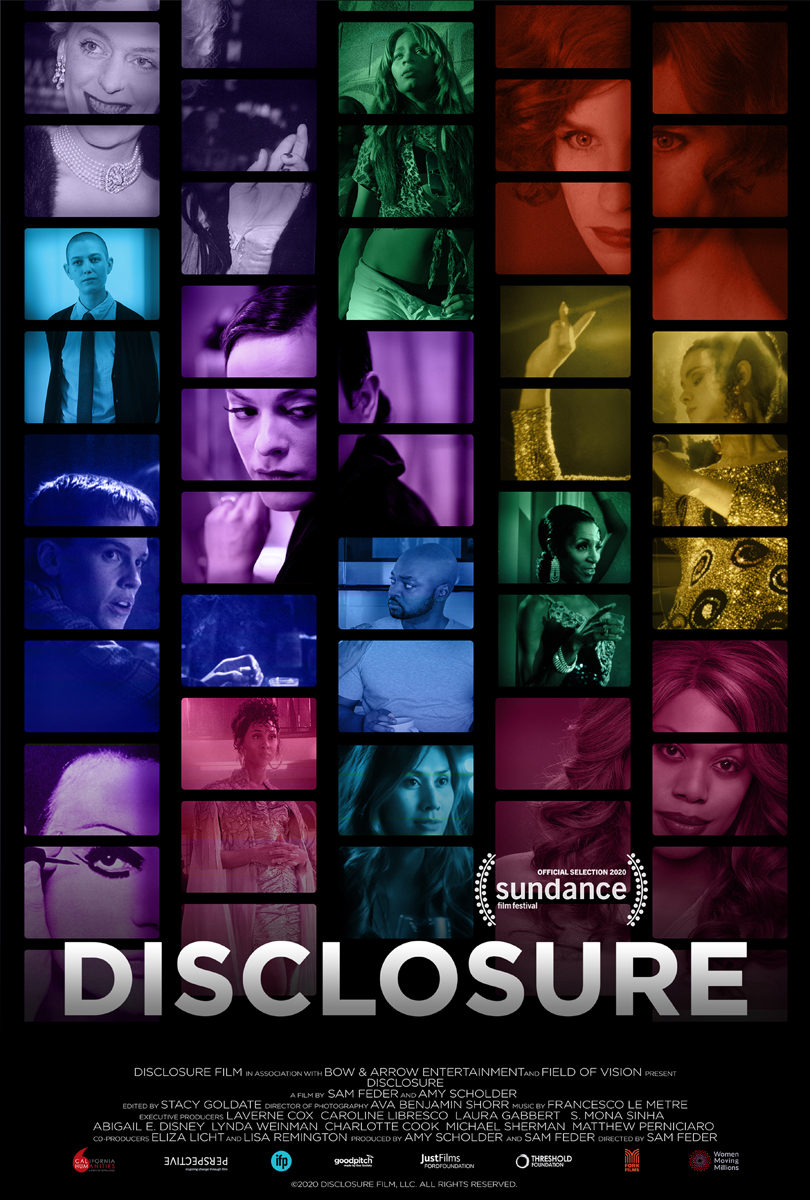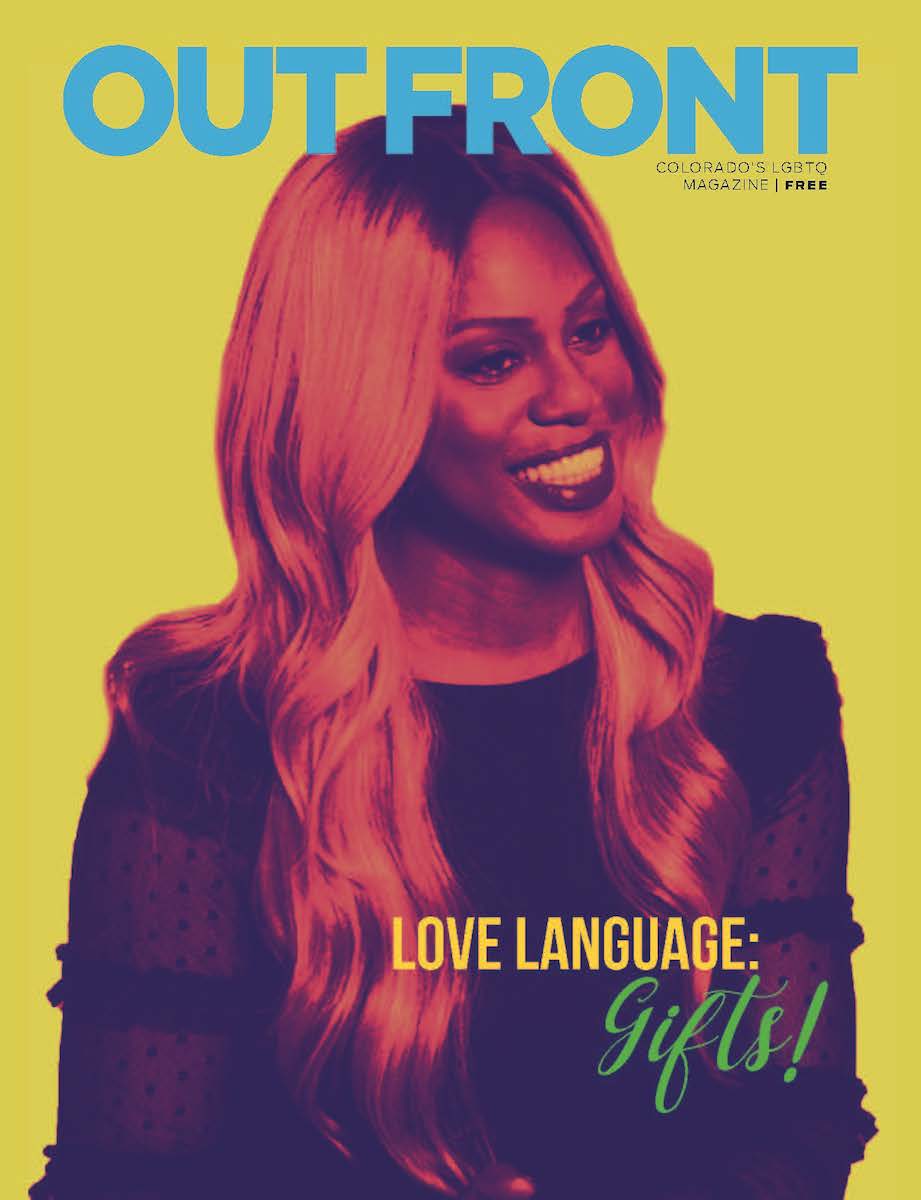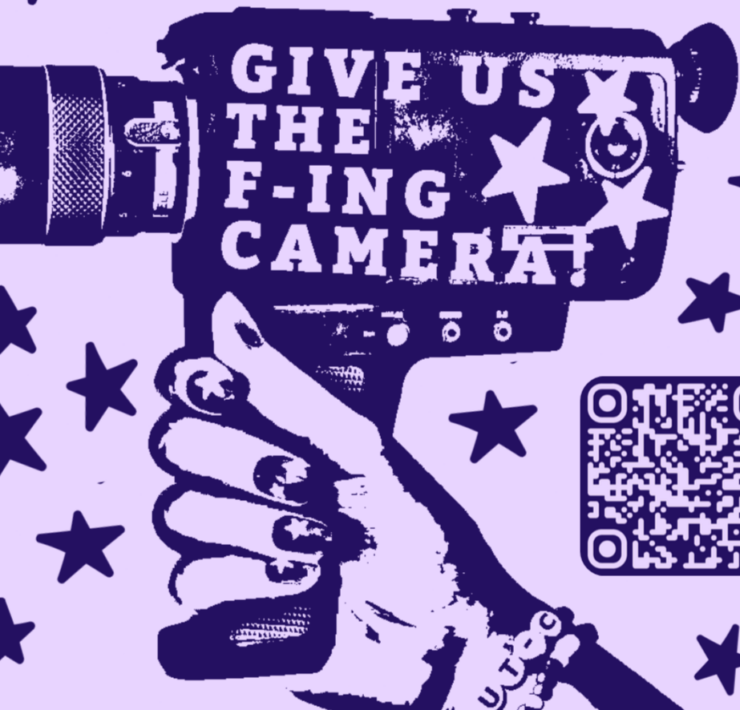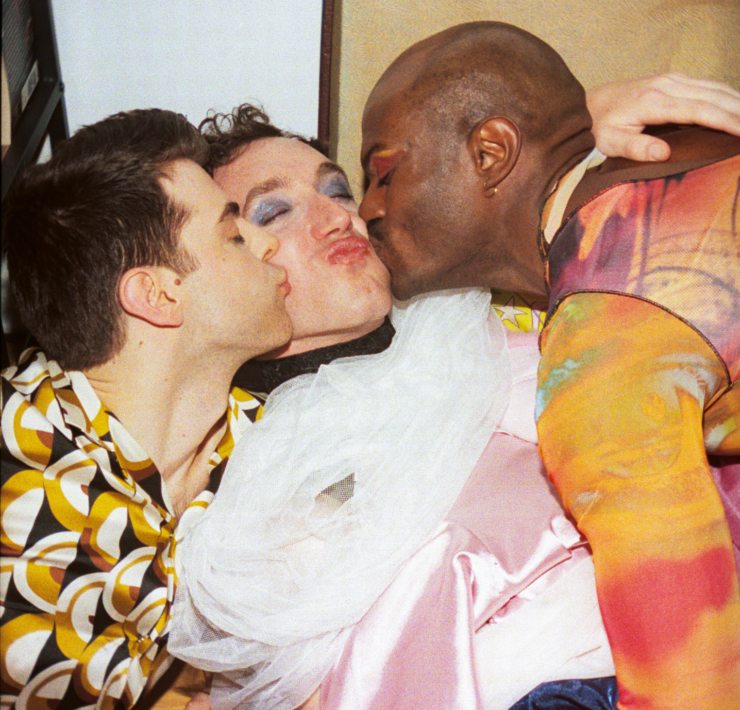Laverne Cox: A Trailblazer for Trans Representation

Denny Patterson is a St. Louis-based entertainment and lifestyle journalist…
The trans liberation movement was still in its early stages when The Celluloid Closet came out in 1995, but once the community started to find its voice, actress and activist Laverne Cox has become a pioneer in the fight.
Since making history as the first transgender person to be nominated for an acting Emmy for playing Sophia in Orange is the New Black and being the first openly transgender person to appear on the cover of Time, Cox has continued to break down barriers. She has been a vocal advocate for more diversity in Hollywood, with a focus on trans people of color. Trans representation deserves to have its very own placement in the history of cinema, and Cox will not rest until that happens.
Now, she is the executive producer of a new film called Disclosure: Trans Lives on Screen. Directed by Sam Feder, this film is an unprecedented, eye-opening look at transgender depictions in film and television, revealing how Hollywood simultaneously reflects and manufactures our deepest anxieties about gender. In addition to Cox, Disclosure features leading trans creatives like Chaz Bono, Alexandra Billings, Jamie Clayton, Angelica Ross, Brian Michael Smith, and Yance Ford who share their reflections and resistance to some of Hollywood’s most beloved moments.
Currently streaming on Netflix, Disclosure provokes a startling revolution in how we see and understand trans people.
OUT FRONT had the pleasure of chatting more with Cox about the film, how important it is to tell trans stories, how Hollywood is getting better at casting trans artists, and how we can increase trans awareness and visibility.
Hi, Laverne! Thank you for taking some time to chat with me about the documentary, Disclosure: Trans Lives on Screen, which you are an executive producer of. How and why did you get involved with this film?
I have always wanted to do a film that looks at the history of trans representation on screen. There are so many things that we need to unpack, and three years ago, I happened to go to a panel event, a conversation at Outfest, and Sam Feder, the director of Disclosure, was giving a presentation that day of the research that would become the film. He had been doing research for about three years before we even met. Interviewing various trans people about their memories of film and television, archiving footage, he had footage that dated back to the early 1900s, and I was like oh my God, this is amazing. I met him after his panel, and we met a week later. I was like, I would love to be involved in this. The interesting thing about putting something into the universe is that just a few weeks earlier, maybe a month or so, I was talking to my manager saying the next project I wanted to be involved with, I wanted to do something on trans history. So, I made a conversation about it and I happened to just be at the panel that day. Sometimes you just need to put it in the universe.
Disclosure may be up for some major awards. How exciting and significant would that be?
Oh my God, I love that there is Oscar buzz about our film and buzz about other awards. We talk about this in Disclosure, people have been winning, particularly Academy Awards, for decades telling trans stories. There has never been an openly trans person to actually win an Academy Award, ever. There have been three openly trans people nominated. Angela Morley, Yance Ford, and Anohni. Three people in the entire history of the Academy. So, it would be amazing if our film got nominated. Our director is trans, the film mostly had a transgender crew, it would be historic. It would be amazing if we won! Think about how many people have profited from trans stories in terms of awards and money. So often, trans people are sort of left out.
What do you hope audiences take away from this film?
So many things. A therapist many years ago said to me in our first session, the only thing we can control are our perception and our behavior. That is all we can control, and I have been thinking a lot about my work in the media, and I think a huge part of it has been about encouraging people to frame things differently. To engage in new perspectives, and I think that is what Disclosure does. I think if we have new perspectives on the world around us and ourselves, then maybe we can behave differently. Maybe we can act differently. Once people have the perspective of what Disclosure offers, I hope people might act differently. One of my favorite things is what Ryan Reynolds said after he saw the film. He said, this film changes the way that I will look at film and changes the way I will make film going forward. For me, that is really what it is all about.
And what have you personally taken away from it?
So much. I learned so much in the course of making this. The big win in this moment is thinking about how amazing trans people are. How amazing our perspectives and stories are. This film centers trans spectatorship. It centers our stories the way we see. It is a beautiful thing, and there has been so much progress, but we still do not get the full trans perspective enough in the media of how we see the world. When I met Sam the first time after we met after that presentation, I relayed to him my story about how much I loved Yentl. As a kid, this particular song, “Will Someone Ever Look at Me That Way?” I related to it so much because I knew I was a girl, but the world did not see the girl that was inside who had crushes on boys. Yentl was the same way. Sam said that changed the way he imagined making this film because he said that is a very specific trans way of looking. This film has reaffirmed how amazing and incredible trans people are.
Disclosure takes us through all areas of trans history in film and media. Were there any facts or discoveries you were shocked to learn about?
One of the earliest films, A Florida Enchantment from 1914, it features a sex change. The first cinematic sex change happened in a silent film in 1914. The man takes a pill and wakes up the next day and becomes a woman, a woman takes a pill and wakes up the next day and becomes a man. As the film sort of played with gender, there is blackface as well. All the stereotypes we begin to see play out around gender also played out around race. These things were intertwined at the very beginning of cinema, and they continue to affect the ways in which we see ourselves and each other. That was kind of mind blowing.
Your good friend Francesco Le Metre composed the film’s score, and it has been talked about widely as being an important element in understanding the film’s emotional element. Do you agree?
Yes. Music is so important in any film, and what Francesco does, there is something very simple about it that doesn’t distract. The right score always heightens the narrative, and he did a great job. Our soundtrack, I believe it is now available on vinyl, so folks should go and get the Disclosure soundtrack.
How were you feeling once you saw the final product?
I mean, there were so many edits [laughs]. The first rough cut I saw was about four hours. Sam was like, it’s a little long. Like, yeah! I was sad about how many things that were cut, ultimately. We had to cut so many things just for time and whatnot, but once we got the final cut, I was so moved. Even though I have been there for many of the interviews, certain interviews continued to make me laugh out loud or cry. Certain interviews still make me think, I wish I had thought about that. Everyone who speaks on screen in our film is trans, but the stories and perspectives they share, and everyone is so brilliant, I was just so moved by it. I am impressed with the incredible cast we were able to put together and what they brought to it, and I would say that is a testament in part to our production model. We were committed to hiring mostly trans people for our crew, and when we could not find someone trans to fill a role, we had this person train a trans person. Everywhere you looked on our set, there were trans people. Our cast who appeared on screen said that made a difference in terms of the comfort level they felt. Sharing their stories, sharing intimate things about their lives, they felt a certain sense of comfort because we were everywhere. That is rare on a film set.

It has always been important to tell trans stories, but do you think there is a great urgency nowadays?
The statistics we cite in Disclosure is that 80 percent of Americans say they do not personally know someone who is transgender. Everything that most Americans learn about trans people, they learn through the media. So, having representations that show our humanity are literally a matter of life and death. That is one of the things that we grapple with in our film. With increased visibility comes increased violence and targeting. We know that this year, the year that Disclosure premiered on Netflix, it is the deadliest year on record for trans people. Even during a global pandemic when everybody is supposed to be at home, we are still getting murdered. Films aren’t everything. People need to change their behaviors, and they need to have access to material resources to change lives and decrease violence.
You make an interesting point in the film about using cancel culture as an excuse to not discuss trans issues. Do you think cancel culture is useful or harmful to social movements?
I don’t believe human beings are disposable. I think when we cancel people, we let go of the idea that people can evolve, change, and be redeemable. I am way more interested in people’s humanity and having empathy for people, even if they cannot muster the empathy for me. I am interested in having a vision for transforming culture instead of disposing human beings.
Related article: Biden Aims to Protect Trans People
How harmful have old stereotypes, memes, and tropes of trans people in the media been in regards to understanding trans issues?
Watching Disclosure, I think we can be really clear about the disparaging, inaccurate, negative, dehumanizing, and degrading portrayals of trans people have taught Americans and people around the world how to think about trans people. The work of undoing that, it is going to take a while. It is going to take some time. Brittany Packnett Cunningham, this brilliant activist, she is as woken as aware as she is about so many issues. She didn’t even realize how much the media had indoctrinated her into certain kinds of thinking about trans people. For me as well, as a trans person. So, that work is so ingrained in ways that we do not even fully understand, and that is really deep. The undoing of that is going to take quite a bit of time.
Why should non trans people watch Disclosure?
For a lot of reasons. To become more aware of the struggles of trans people, how the media has taught them to think about trans people, and I always believe that trans people present an opportunity, if folks choose to accept that opportunity, for us to have a critical interrogation with the assumptions we have made about our own genders. We can begin to unpack that, and I think having moments of critical self-reflection are not only useful, but necessary for us to personally transform. We are never going to change the world if people do not have moments with themselves to say, how am I implicated in the discrimination against another community? How am I implicated in racism, sexism, etc., and then begin to act differently? I think everybody should watch Disclosure to have those moments of critical self-reflection, interrogation, and hopefully transformation. Also, it reminded me of how much not all media can propagandize or sway our views. We are seeing a lot of that right now. I think having critical reflection on media right now is very important. It is crucial.
You are an icon who has contributed so much to the trans community. Did you ever think you would be a trailblazer?
I think, I hoped. I hoped my work as an artist could make things better for people who might follow me. I have told this story a million times, but when I was about five or six years old, my mother gave me this Black history book with biographies of famous African Americans with little photos of them. I carried the book around with all the time, and I was like, oh my God, how amazing it would be to be an artist. I was already wanting to be a dancer, but like, it would be amazing if my work as an artist could make things better and pave a path for people who followed me. That thought was sort of planted in my mind very early on. Like, this would be cool to be in the tradition of people like Leontyne Price, Arthur Mitchell, or Katherine Dunham in some way.
Hollywood has been known to drag its feet when it comes to casting trans performers. Do you believe this is still the case?
It’s getting better. It is definitely getting better, but there can always be more progress. What I am excited about with my own career is that I am being offered roles that are not necessarily written for trans actors. That has happened a few times, and that is very exciting and important for casting directors, working executives, directors, and producers to think out of the box in terms of casting. Then there are so many trans stories that need to be told. So, I think we are making progress, but I think we have a long way to go because there are just so many stories out there.
Should trans people only play trans roles? This can also be said for any LGBTQ person playing LGBTQ roles.
No, absolutely not. My shortest answer of the day [laughs]. Actors are trained to play a plethora of different characters, and it is really about whether you are right for something. When Shonda Rhimes had me in mind to play the role I am playing now, Kacy Duke in her Netflix series Inventing Anna, Shonda thought about who could possibly play Kacy, and she thought I would be the best person for the part. Kacy is a real-life person who happens to be a cis woman, but it shouldn’t matter. It should not matter if you are trans or not, it should be about who is the best person for the role. By the same token though, I also think if it were reversed, even though I would tell a cis person they shouldn’t play a trans person, I think again, we should also think about the potential impact of cis people playing trans folks. Then think about that impact, and go in with awareness, then make whatever artistic decisions you need to make.
What more needs to be done to increase trans visibility and normalize trans folks in the queer community?
I don’t think it is just the queer community, but starting at home with my LGBTQ family, it has been interesting. There has been so much progress within our community, but I still see a lot of folks saying that trans people should not be a part of the LGBTQ. I mean, I cannot believe in 2020 we still see this. Like, trans people should not be involved, and people say if this is gender identity, then gay, lesbian and bisexual is sexual orientation. That is absolutely true, but I think that perspective is ahistorical and apolitical. It does not reflect the reality of the ways in which people historically and erroneously conflated sexual orientation and gender identity, but because of that historic conflation, we have all been lumped together. So, we are in this struggle together. Then the fight for equality and justice for everybody, it is intersectional anyways. Gender identity can intersect with sexual orientation. There are a lot of trans people who are bisexual, gay, or lesbian. Then there are people of color, so all of this is intersectional. I think everybody in our communities need to ask themselves if they are really interested in justice for everybody. That justice should not be just for us. It shouldn’t be like, I got my rights, I’m good. Justice should be about everybody whether they are trans, people of color, working class, disabled. If we are interested in justice, then that should be about building coalitions across our differences.
Besides Disclosure, what are some other top trans-inclusive films you would recommend checking out?
Wow, that is a great question. Lingua Franca is a beautiful film. It premiered earlier this year on Netflix, and it was written and directed by a trans woman, and she is also Filipino American. It is a beautiful story. There is a TV show on YouTube called King Ester, and it tells the story of a girl named Ester in pre-Katrina leading up to Hurricane Katrina in New Orleans. Ester is played by Rowin Amone, and she gives such a forced, raw performance that I loved. There is also Gun Hill Road which is a beautiful film from around 2011 starring Harmony Santana about a young trans woman and her family. This was the first time Harmony Santana received an Independent Spirit Award nomination for her performance, and Gun Hill Road is the first time an openly transgender actor was nominated for an Independent Spirit Award.
Before we wrap up, are they any other upcoming projects you would like to mention or plug?
I have a film on Hulu right now called Bad Hair, directed by Justin Simien. People should check that out. I have a film called Promising Young Woman that is supposed to come out Christmas Day that was directed and produced by Emerald Fennell. Inventing Anna on Netflix comes out either next year or the year after, so keep checking on that.
To stay-up-to-date with Cox, follow her on Facebook, Twitter, Instagram and Snapchat, or visit lavernecox.com. Disclosure is now streaming on Netflix.
*Images courtesy of Netflix
What's Your Reaction?
Denny Patterson is a St. Louis-based entertainment and lifestyle journalist who serves as OFM's Celebrity Correspondent. Outside of writing, some of his interests include traveling, binge watching TV shows and movies, reading (books and people!), and spending time with his husband and pets. Denny is also the Senior Lifestyle Writer for South Florida's OutClique Magazine and a contributing writer for Instinct Magazine. Connect with him on Instagram: @dennyp777.











